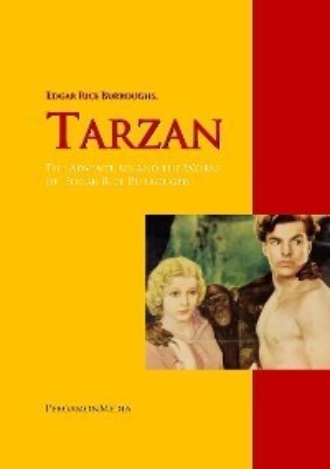
Полная версия
Tarzan: The Adventures and the Works of Edgar Rice Burroughs
At that part of the circle closest to the Waziri, a constant fusillade of shots was poured into the bushes behind which the black warriors had concealed themselves. The latter, on their part, loosed their slim shafts at the nearest of the enemy.
The Waziri, justly famed for their archery, found no cause to blush for their performance that day. Time and again some swarthy horseman threw hands above his head and toppled from his saddle, pierced by a deadly arrow; but the contest was uneven. The Arabs outnumbered the Waziri; their bullets penetrated the shrubbery and found marks that the Arab riflemen had not even seen; and then Achmet Zek circled inward a half mile above the bungalow, tore down a section of the fence, and led his marauders within the grounds.
Across the fields they charged at a mad run. Not again did they pause to lower fences, instead, they drove their wild mounts straight for them, clearing the obstacles as lightly as winged gulls.
Mugambi saw them coming, and, calling those of his warriors who remained, ran for the bungalow and the last stand. Upon the veranda Lady Greystoke stood, rifle in hand. More than a single raider had accounted to her steady nerves and cool aim for his outlawry; more than a single pony raced, riderless, in the wake of the charging horde.
Mugambi pushed his mistress back into the greater security of the interior, and with his depleted force prepared to make a last stand against the foe.
On came the Arabs, shouting and waving their long guns above their heads. Past the veranda they raced, pouring a deadly fire into the kneeling Waziri who discharged their volley of arrows from behind their long, oval shields—shields well adapted, perhaps, to stop a hostile arrow, or deflect a spear; but futile, quite, before the leaden missiles of the riflemen.
From beneath the half-raised shutters of the bungalow other bowmen did effective service in greater security, and after the first assault, Mugambi withdrew his entire force within the building.
Again and again the Arabs charged, at last forming a stationary circle about the little fortress, and outside the effective range of the defenders' arrows. From their new position they fired at will at the windows. One by one the Waziri fell. Fewer and fewer were the arrows that replied to the guns of the raiders, and at last Achmet Zek felt safe in ordering an assault.
Firing as they ran, the bloodthirsty horde raced for the veranda. A dozen of them fell to the arrows of the defenders; but the majority reached the door. Heavy gun butts fell upon it. The crash of splintered wood mingled with the report of a rifle as Jane Clayton fired through the panels upon the relentless foe.
Upon both sides of the door men fell; but at last the frail barrier gave to the vicious assaults of the maddened attackers; it crumpled inward and a dozen swarthy murderers leaped into the living-room. At the far end stood Jane Clayton surrounded by the remnant of her devoted guardians. The floor was covered by the bodies of those who already had given up their lives in her defense. In the forefront of her protectors stood the giant Mugambi. The Arabs raised their rifles to pour in the last volley that would effectually end all resistance; but Achmet Zek roared out a warning order that stayed their trigger fingers.
"Fire not upon the woman!" he cried. "Who harms her, dies. Take the woman alive!"
The Arabs rushed across the room; the Waziri met them with their heavy spears. Swords flashed, long-barreled pistols roared out their sullen death dooms. Mugambi launched his spear at the nearest of the enemy with a force that drove the heavy shaft completely through the Arab's body, then he seized a pistol from another, and grasping it by the barrel brained all who forced their way too near his mistress.
Emulating his example the few warriors who remained to him fought like demons; but one by one they fell, until only Mugambi remained to defend the life and honor of the ape-man's mate.
From across the room Achmet Zek watched the unequal struggle and urged on his minions. In his hands was a jeweled musket. Slowly he raised it to his shoulder, waiting until another move should place Mugambi at his mercy without endangering the lives of the woman or any of his own followers.
At last the moment came, and Achmet Zek pulled the trigger. Without a sound the brave Mugambi sank to the floor at the feet of Jane Clayton.
An instant later she was surrounded and disarmed. Without a word they dragged her from the bungalow. A giant Negro lifted her to the pommel of his saddle, and while the raiders searched the bungalow and outhouses for plunder he rode with her beyond the gates and waited the coming of his master.
Jane Clayton saw the raiders lead the horses from the corral, and drive the herds in from the fields. She saw her home plundered of all that represented intrinsic worth in the eyes of the Arabs, and then she saw the torch applied, and the flames lick up what remained.
And at last, when the raiders assembled after glutting their fury and their avarice, and rode away with her toward the north, she saw the smoke and the flames rising far into the heavens until the winding of the trail into the thick forests hid the sad view from her eyes.
As the flames ate their way into the living-room, reaching out forked tongues to lick up the bodies of the dead, one of that gruesome company whose bloody welterings had long since been stilled, moved again. It was a huge black who rolled over upon his side and opened blood-shot, suffering eyes. Mugambi, whom the Arabs had left for dead, still lived. The hot flames were almost upon him as he raised himself painfully upon his hands and knees and crawled slowly toward the doorway.
Again and again he sank weakly to the floor; but each time he rose again and continued his pitiful way toward safety. After what seemed to him an interminable time, during which the flames had become a veritable fiery furnace at the far side of the room, the great black managed to reach the veranda, roll down the steps, and crawl off into the cool safety of some nearby shrubbery.
All night he lay there, alternately unconscious and painfully sentient; and in the latter state watching with savage hatred the lurid flames which still rose from burning crib and hay cock. A prowling lion roared close at hand; but the giant black was unafraid. There was place for but a single thought in his savage mind—revenge! revenge! revenge!
7
The Jewel-Room of Opar
For some time Tarzan lay where he had fallen upon the floor of the treasure chamber beneath the ruined walls of Opar. He lay as one dead; but he was not dead. At length he stirred. His eyes opened upon the utter darkness of the room. He raised his hand to his head and brought it away sticky with clotted blood. He sniffed at his fingers, as a wild beast might sniff at the life-blood upon a wounded paw.
Slowly he rose to a sitting posture—listening. No sound reached to the buried depths of his sepulcher. He staggered to his feet, and groped his way about among the tiers of ingots. What was he? Where was he? His head ached; but otherwise he felt no ill effects from the blow that had felled him. The accident he did not recall, nor did he recall aught of what had led up to it.
He let his hands grope unfamiliarly over his limbs, his torso, and his head. He felt of the quiver at his back, the knife in his loin cloth. Something struggled for recognition within his brain. Ah! he had it. There was something missing. He crawled about upon the floor, feeling with his hands for the thing that instinct warned him was gone. At last he found it—the heavy war spear that in past years had formed so important a feature of his daily life, almost of his very existence, so inseparably had it been connected with his every action since the long-gone day that he had wrested his first spear from the body of a black victim of his savage training.
Tarzan was sure that there was another and more lovely world than that which was confined to the darkness of the four stone walls surrounding him. He continued his search and at last found the doorway leading inward beneath the city and the temple. This he followed, most incautiously. He came to the stone steps leading upward to the higher level. He ascended them and continued onward toward the well.
Nothing spurred his hurt memory to a recollection of past familiarity with his surroundings. He blundered on through the darkness as though he were traversing an open plain under the brilliance of a noonday sun, and suddenly there happened that which had to happen under the circumstances of his rash advance.
He reached the brink of the well, stepped outward into space, lunged forward, and shot downward into the inky depths below. Still clutching his spear, he struck the water, and sank beneath its surface, plumbing the depths.
The fall had not injured him, and when he rose to the surface, he shook the water from his eyes, and found that he could see. Daylight was filtering into the well from the orifice far above his head. It illumined the inner walls faintly. Tarzan gazed about him. On the level with the surface of the water he saw a large opening in the dark and slimy wall. He swam to it, and drew himself out upon the wet floor of a tunnel.
Along this he passed; but now he went warily, for Tarzan of the Apes was learning. The unexpected pit had taught him care in the traversing of dark passageways—he needed no second lesson.
For a long distance the passage went straight as an arrow. The floor was slippery, as though at times the rising waters of the well overflowed and flooded it. This, in itself, retarded Tarzan's pace, for it was with difficulty that he kept his footing.
The foot of a stairway ended the passage. Up this he made his way. It turned back and forth many times, leading, at last, into a small, circular chamber, the gloom of which was relieved by a faint light which found ingress through a tubular shaft several feet in diameter which rose from the center of the room's ceiling, upward to a distance of a hundred feet or more, where it terminated in a stone grating through which Tarzan could see a blue and sun-lit sky.
Curiosity prompted the ape-man to investigate his surroundings. Several metal-bound, copper-studded chests constituted the sole furniture of the round room. Tarzan let his hands run over these. He felt of the copper studs, he pulled upon the hinges, and at last, by chance, he raised the cover of one.
An exclamation of delight broke from his lips at sight of the pretty contents. Gleaming and glistening in the subdued light of the chamber, lay a great tray full of brilliant stones. Tarzan, reverted to the primitive by his accident, had no conception of the fabulous value of his find. To him they were but pretty pebbles. He plunged his hands into them and let the priceless gems filter through his fingers. He went to others of the chests, only to find still further stores of precious stones. Nearly all were cut, and from these he gathered a handful and filled the pouch which dangled at his side—the uncut stones he tossed back into the chests.
Unwittingly, the ape-man had stumbled upon the forgotten jewel-room of Opar. For ages it had lain buried beneath the temple of the Flaming God, midway of one of the many inky passages which the superstitious descendants of the ancient Sun Worshipers had either dared not or cared not to explore.
Tiring at last of this diversion, Tarzan took up his way along the corridor which led upward from the jewel-room by a steep incline. Winding and twisting, but always tending upward, the tunnel led him nearer and nearer to the surface, ending finally in a low-ceiled room, lighter than any that he had as yet discovered.
Above him an opening in the ceiling at the upper end of a flight of concrete steps revealed a brilliant sunlit scene. Tarzan viewed the vine-covered columns in mild wonderment. He puckered his brows in an attempt to recall some recollection of similar things. He was not sure of himself. There was a tantalizing suggestion always present in his mind that something was eluding him—that he should know many things which he did not know.
His earnest cogitation was rudely interrupted by a thunderous roar from the opening above him. Following the roar came the cries and screams of men and women. Tarzan grasped his spear more firmly and ascended the steps. A strange sight met his eyes as he emerged from the semi-darkness of the cellar to the brilliant light of the temple.
The creatures he saw before him he recognized for what they were—men and women, and a huge lion. The men and women were scuttling for the safety of the exits. The lion stood upon the body of one who had been less fortunate than the others. He was in the center of the temple. Directly before Tarzan, a woman stood beside a block of stone. Upon the top of the stone lay stretched a man, and as the ape-man watched the scene, he saw the lion glare terribly at the two who remained within the temple. Another thunderous roar broke from the savage throat, the woman screamed and swooned across the body of the man stretched prostrate upon the stone altar before her.
The lion advanced a few steps and crouched. The tip of his sinuous tail twitched nervously. He was upon the point of charging when his eyes were attracted toward the ape-man.
Werper, helpless upon the altar, saw the great carnivore preparing to leap upon him. He saw the sudden change in the beast's expression as his eyes wandered to something beyond the altar and out of the Belgian's view. He saw the formidable creature rise to a standing position. A figure darted past Werper. He saw a mighty arm upraised, and a stout spear shoot forward toward the lion, to bury itself in the broad chest.
He saw the lion snapping and tearing at the weapon's shaft, and he saw, wonder of wonders, the naked giant who had hurled the missile charging upon the great beast, only a long knife ready to meet those ferocious fangs and talons.
The lion reared up to meet this new enemy. The beast was growling frightfully, and then upon the startled ears of the Belgian, broke a similar savage growl from the lips of the man rushing upon the beast.
By a quick side step, Tarzan eluded the first swinging clutch of the lion's paws. Darting to the beast's side, he leaped upon the tawny back. His arms encircled the maned neck, his teeth sank deep into the brute's flesh. Roaring, leaping, rolling and struggling, the giant cat attempted to dislodge this savage enemy, and all the while one great, brown fist was driving a long keen blade repeatedly into the beast's side.
During the battle, La regained consciousness. Spellbound, she stood above her victim watching the spectacle. It seemed incredible that a human being could best the king of beasts in personal encounter and yet before her very eyes there was taking place just such an improbability.
At last Tarzan's knife found the great heart, and with a final, spasmodic struggle the lion rolled over upon the marble floor, dead. Leaping to his feet the conqueror placed a foot upon the carcass of his kill, raised his face toward the heavens, and gave voice to so hideous a cry that both La and Werper trembled as it reverberated through the temple.
Then the ape-man turned, and Werper recognized him as the man he had left for dead in the treasure room.
8
The Escape from Opar
Werper was astounded. Could this creature be the same dignified Englishman who had entertained him so graciously in his luxurious African home? Could this wild beast, with blazing eyes, and bloody countenance, be at the same time a man? Could the horrid, victory cry he had but just heard have been formed in human throat?
Tarzan was eyeing the man and the woman, a puzzled expression in his eyes, but there was no faintest tinge of recognition. It was as though he had discovered some new species of living creature and was marveling at his find.
La was studying the ape-man's features. Slowly her large eyes opened very wide.
"Tarzan!" she exclaimed, and then, in the vernacular of the great apes which constant association with the anthropoids had rendered the common language of the Oparians: "You have come back to me! La has ignored the mandates of her religion, waiting, always waiting for Tarzan—for her Tarzan. She has taken no mate, for in all the world there was but one with whom La would mate. And now you have come back! Tell me, O Tarzan, that it is for me you have returned."
Werper listened to the unintelligible jargon. He looked from La to Tarzan. Would the latter understand this strange tongue? To the Belgian's surprise, the Englishman answered in a language evidently identical to hers.
"Tarzan," he repeated, musingly. "Tarzan. The name sounds familiar."
"It is your name—you are Tarzan," cried La.
"I am Tarzan?" The ape-man shrugged. "Well, it is a good name—I know no other, so I will keep it; but I do not know you. I did not come hither for you. Why I came, I do not know at all; neither do I know from whence I came. Can you tell me?"
La shook her head. "I never knew," she replied.
Tarzan turned toward Werper and put the same question to him; but in the language of the great apes. The Belgian shook his head.
"I do not understand that language," he said in French.
Without effort, and apparently without realizing that he made the change, Tarzan repeated his question in French. Werper suddenly came to a full realization of the magnitude of the injury of which Tarzan was a victim. The man had lost his memory—no longer could he recollect past events. The Belgian was upon the point of enlightening him, when it suddenly occurred to him that by keeping Tarzan in ignorance, for a time at least, of his true identity, it might be possible to turn the ape-man's misfortune to his own advantage.
"I cannot tell you from whence you came," he said; "but this I can tell you—if we do not get out of this horrible place we shall both be slain upon this bloody altar. The woman was about to plunge her knife into my heart when the lion interrupted the fiendish ritual. Come! Before they recover from their fright and reassemble, let us find a way out of their damnable temple."
Tarzan turned again toward La.
"Why," he asked, "would you have killed this man? Are you hungry?"
The High Priestess cried out in disgust.
"Did he attempt to kill you?" continued Tarzan.
The woman shook her head.
"Then why should you have wished to kill him?" Tarzan was determined to get to the bottom of the thing.
La raised her slender arm and pointed toward the sun.
"We were offering up his soul as a gift to the Flaming God," she said.
Tarzan looked puzzled. He was again an ape, and apes do not understand such matters as souls and Flaming Gods.
"Do you wish to die?" he asked Werper.
The Belgian assured him, with tears in his eyes, that he did not wish to die.
"Very well then, you shall not," said Tarzan. "Come! We will go. This SHE would kill you and keep me for herself. It is no place anyway for a Mangani. I should soon die, shut up behind these stone walls."
He turned toward La. "We are going now," he said.
The woman rushed forward and seized the ape-man's hands in hers.
"Do not leave me!" she cried. "Stay, and you shall be High Priest. La loves you. All Opar shall be yours. Slaves shall wait upon you. Stay, Tarzan of the Apes, and let love reward you."
The ape-man pushed the kneeling woman aside. "Tarzan does not desire you," he said, simply, and stepping to Werper's side he cut the Belgian's bonds and motioned him to follow.
Panting—her face convulsed with rage, La sprang to her feet.
"Stay, you shall!" she screamed. "La will have you—if she cannot have you alive, she will have you dead," and raising her face to the sun she gave voice to the same hideous shriek that Werper had heard once before and Tarzan many times.
In answer to her cry a babel of voices broke from the surrounding chambers and corridors.
"Come, Guardian Priests!" she cried. "The infidels have profaned the holiest of the holies. Come! Strike terror to their hearts; defend La and her altar; wash clean the temple with the blood of the polluters."
Tarzan understood, though Werper did not. The former glanced at the Belgian and saw that he was unarmed. Stepping quickly to La's side the ape-man seized her in his strong arms and though she fought with all the mad savagery of a demon, he soon disarmed her, handing her long, sacrificial knife to Werper.
"You will need this," he said, and then from each doorway a horde of the monstrous, little men of Opar streamed into the temple.
They were armed with bludgeons and knives, and fortified in their courage by fanatical hate and frenzy. Werper was terrified. Tarzan stood eyeing the foe in proud disdain. Slowly he advanced toward the exit he had chosen to utilize in making his way from the temple. A burly priest barred his way. Behind the first was a score of others. Tarzan swung his heavy spear, clublike, down upon the skull of the priest. The fellow collapsed, his head crushed.
Again and again the weapon fell as Tarzan made his way slowly toward the doorway. Werper pressed close behind, casting backward glances toward the shrieking, dancing mob menacing their rear. He held the sacrificial knife ready to strike whoever might come within its reach; but none came. For a time he wondered that they should so bravely battle with the giant ape-man, yet hesitate to rush upon him, who was relatively so weak. Had they done so he knew that he must have fallen at the first charge. Tarzan had reached the doorway over the corpses of all that had stood to dispute his way, before Werper guessed at the reason for his immunity. The priests feared the sacrificial knife! Willingly would they face death and welcome it if it came while they defended their High Priestess and her altar; but evidently there were deaths, and deaths. Some strange superstition must surround that polished blade, that no Oparian cared to chance a death thrust from it, yet gladly rushed to the slaughter of the ape-man's flaying spear.
Once outside the temple court, Werper communicated his discovery to Tarzan. The ape-man grinned, and let Werper go before him, brandishing the jeweled and holy weapon. Like leaves before a gale, the Oparians scattered in all directions and Tarzan and the Belgian found a clear passage through the corridors and chambers of the ancient temple.
The Belgian's eyes went wide as they passed through the room of the seven pillars of solid gold. With ill-concealed avarice he looked upon the age-old, golden tablets set in the walls of nearly every room and down the sides of many of the corridors. To the ape-man all this wealth appeared to mean nothing.
On the two went, chance leading them toward the broad avenue which lay between the stately piles of the half-ruined edifices and the inner wall of the city. Great apes jabbered at them and menaced them; but Tarzan answered them after their own kind, giving back taunt for taunt, insult for insult, challenge for challenge.
Werper saw a hairy bull swing down from a broken column and advance, stiff-legged and bristling, toward the naked giant. The yellow fangs were bared, angry snarls and barkings rumbled threateningly through the thick and hanging lips.
The Belgian watched his companion. To his horror, he saw the man stoop until his closed knuckles rested upon the ground as did those of the anthropoid. He saw him circle, stiff-legged about the circling ape. He heard the same bestial barkings and growlings issue from the human throat that were coming from the mouth of the brute. Had his eyes been closed he could not have known but that two giant apes were bridling for combat.
But there was no battle. It ended as the majority of such jungle encounters end—one of the boasters loses his nerve, and becomes suddenly interested in a blowing leaf, a beetle, or the lice upon his hairy stomach.
In this instance it was the anthropoid that retired in stiff dignity to inspect an unhappy caterpillar, which he presently devoured. For a moment Tarzan seemed inclined to pursue the argument. He swaggered truculently, stuck out his chest, roared and advanced closer to the bull. It was with difficulty that Werper finally persuaded him to leave well enough alone and continue his way from the ancient city of the Sun Worshipers.






